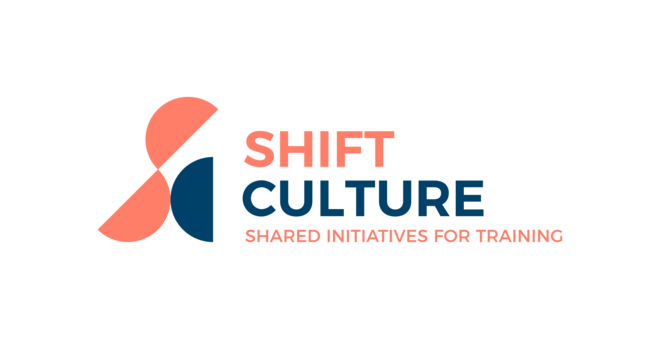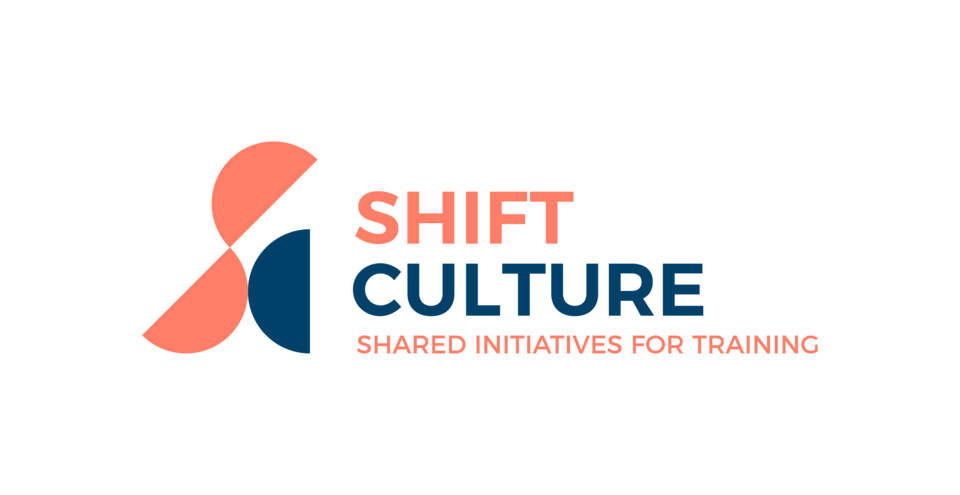

→ Discover our newsletters on SHIFT:
Implement the SHIFT Eco-Guidelines for Networks
Discover now all the SHIFT results
SHIFT Partners Sign Letter of Intent on Climate Action
SHIFT Taking the Lead on Climate Action
SHIFT Share Your Stories on Gender & Power Relations
SHIFT Share Your Stories on Cultural Leadership
SHIFT Share Your Stories on Inclusion
SHIFT Share Your Stories on Environmental Sustainability
Let's get the SHIFT started
Say what? Say SHIFT!
Shared Initiatives for Training
SHIFT Culture
Climate change, gender equality and inclusion of minorities are key challenges for our rapidly changing world. Arts and culture have a recognised role in shaping societies and have the potential to significantly contribute to a better and more sustainable future for all as recognised in the UN Sustainable Development Goals (SDGs). The project SHIFT will provide training initiatives for cultural leaders, working together and creating paths to face such global challenges. Implementing changes where needed and passing on the gained knowledge to leaders and staff members, of cultural networks and the broader cultural sector are key targets of the project.
The partners will produce online manuals and guidelines during these two next years (December 2019-December 2021) on the following themes:
► Cultural Leadership
Cultural leadership is a broad concept that can be interpreted and practised in different ways. It can be seen twofold, firstly as the act of managing organisations in the cultural sector and secondly as leading through cultural lenses. There is no unique definition of what a leader should be and if the cultural sector needs a particular managerial strategy. Each individual, civilisation, community is bound to have a different set of cultural experiences and history and will equally need different ways of achieving a common project whether it is to lead an organisation or to achieve a goal.
The project SHIFT will attempt to give guidance on ways of leading an organisation in the cultural sector.
Watch the recording on Cultural Leadership of the SHIFT Final Event
► Environmental Sustainability
Achieving environmental sustainability is one of the biggest challenges of our century. Humankind needs to change the way it interacts with the environment to ensure that the living world can support the needs of future generations. Scientific facts underline the urgency of the situation. Joint commitment and action by leaders around the world are crucial elements in achieving a shift in all aspects of society: economic, educational, scientific, cultural, and many more. Leadership is needed to support and carry change towards a more environmentally sustainable world.
Watch the recording on Environmental Sustainability of the SHIFT Final Event
► Gender and Power Relations
The global movement of #METOO, which started in 2017, increased awareness and empowered employees and professionals across the globe to report sexual harassment and other inequalities in the workplace. #METOO brought to the surface the vulnerability and a lack of effective protection mechanisms of anyone facing power abuse, regardless of age, class and gender.
It still remains to be seen whether the wave of empowerment brought by #METOO will have a lasting impact on professional and societal culture. For that to happen, the leaders of the SHIFT Cultural Networks believe focus needs to shift away from victims to structures.
Watch the recording on Gender and Power Relations of the SHIFT Final Event here
► Inclusion
Creating a more inclusive society lies in guaranteeing the right to access all aspects of society and the autonomy of decision-making for all – irrespective of age, sex, gender identity, sexual orientation, ability, race, ethnicity, origin, religion, or economic or other status. It touches on all aspects of a diverse society: communication, accessibility, governance, leadership, and so on.
Diversity in leadership is key to bringing in different ways of working, thinking and being as a result of different experiences, characteristics, backgrounds, and ways of viewing the world. More diverse representation now can encourage a greater diversity of leaders in the future, breaking down conscious and unconscious assumptions about ‘what a leader looks like’.
Watch the recording on Inclusion of the SHIFT Final Event here
The EMC has brought together the following partners:







